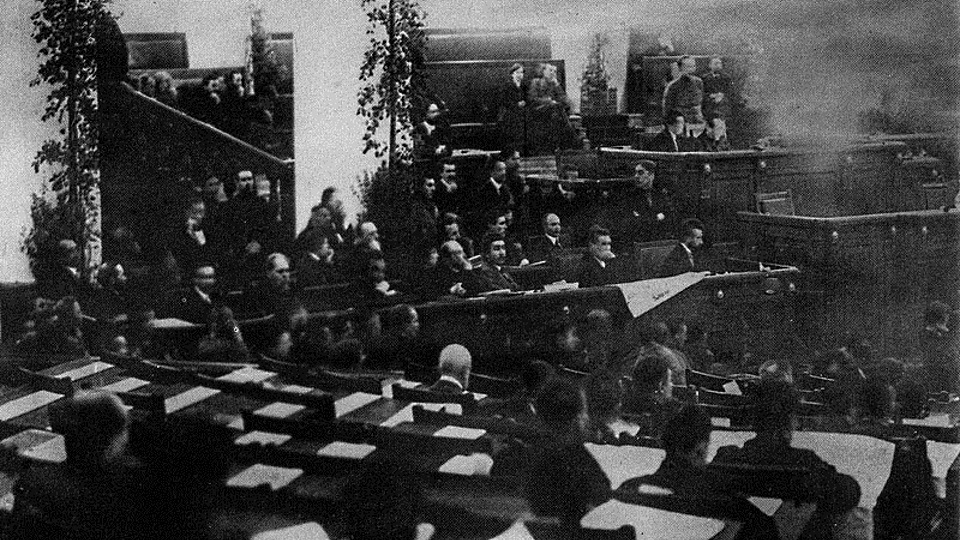1. A meeting awaited by almost everyone
The All Russian Constituent Assembly had to settle the most important matters of how the future make-up of the state would turn out. At least that's what the Provisional Government and Russia's democrats thought. But the election and meeting of the assembly was repeatedly delayed, and when it finally convened the Provisional Government was already out of power, with Bolsheviks, the opponents of the assembly, having taken over. Lenin did allow that the assembly could be elected and became a candidate himself, however the Bolsheviks were openly declaring that the reins of power should have to be held not by the Constituent Assembly but rather the proletarian Soviets.
2. What was discussed in the meeting?
Right after convening, the Constituent Assembly revoked a resolution proposed by the Bolsheviks that would bestow legal powers upon them. Therefore the Bolsheviks and their Left SRs (Bolshevik-sympathizing members of the Socialist Revolutionaries) walked out of the meeting, chaired by Viktor Chernov, a prominent figure in the Socialist Revolutionaries.
Later they discussed peace talks that were without a doubt the most pressing question both for Russia and for Latvia. Peace talks between Germany and the new Bolshevik government of Soviet Russia were already being held in Brest-Litovsk.
The assembly proclaimed a radical land reform, and a law making Russia a democratic federal republic. The meeting lasted for about 12 hours and 40 minutes.
3. Bolsheviks dissolve the meeting
On January 19, 1918 a guard unit led by sailor A. G. Zheleznyakov interrupted the meeting, saying the guards are tired. Before that, the Tauride palace was filled to the brim by sailors armed to the grinning teeth, and by soldiers in frost-covered uniforms.
The delegates were forced to leave the palace and were barred from coming back inside.
Lenin's Soviet government considered the Constituent Assembly as its greatest threat and main competitor for power in Russia.
The Bolsheviks banned the assembly's demonstrations and used military force to disperse them in Petrograd and Moscow. In Petrograd, where the 6th Tukums Latvian Riflemen Regiment was based, 21 people were killed and several hundred wounded. After it became known the Constituent Assembly had been dissolved, Latvian Social Democrats took to the streets of Valka to protest, but Latvian Riflemen chased them away.
On January 20, the sailors loyal to the Bolsheviks killed Andrei Shingarev, the head of the Constitutional Democratic Party (Kadets), as well as Fyodor Kokoshkin, his party mate and State Auditor of the Provisional Government.
The oppression of the meeting became one of the chief causes of Russian civil war and the territorial dissolution of Russia.
4. Jānis Goldmanis' speech
The meeting was also a speech-giving opportunity for Latvian delegate Jānis Goldmanis, the only Latvian from six not representing the Bolsheviks.
Later he will interpret the speech, prepared diligently by the Foreign Affairs department of the Latvian Provisional National Council, as the declaration of Latvian independence.
Goldmanis, together with his secretary and bodyguard, participated in the assembly's march to the Tauride palace. His bodyguard, a former wood sorter with a formidable build, was carrying the Latvian red-white-red flag.
Here are some fragments from Goldmanis' speech in the Constituent Assembly.
"The way Latvia's fate will play out, with the matter of peace agreement, is of great importance to all the peoples of Russia, which have stepped on the way to self-governance.. We, Latvians, cannot forget the years of slavery under the Germans, allowed so greatly by the Russian autocracy. From the democratic Russia we expect different treatment, based on the declared principles of peoples' autonomy..
"United into a freely established political organism, Latvians will be like a great dam in the Eastern part of Europe, by the Baltic Sea.. Latvia has been Russia's window to occidental Europe. It should in the future be the door to Russia for democratic Europe and our allied America..
"The Latvian matter has become international, and the Latvian people are sure that our allies will not submit to allow setting up front-posts for the Germans in free Latvia, which could be obstacles for any ties occidental Europe could set up with the newly established Russian Federative Republic..
"Yes, the Latvian people arduously strive for peace, too, but it does not want a 'peace of the dead' that would see it buried after being ripped to pieces..
The Latvian Provisional National Council, uniting all the national elements of Latvian organizations.. adopted the following decisions concerning Latvia's international standing in its first session: "Taking into account how Latvians have striven for freedom and an autonomous Latvia since ancient times, which was clearly expressed in the 1905 freedom fights.. declaring that Latvia, which consists of Vidzeme, Kurzeme, and Latgale, is an autonomous state unit, the standing of which, the foreign connections and the form of government will be set by the Constitutional Assembly and a people's plebiscite."
Why is this important?
After the Russian Constituent Assembly was dissolved, the peoples living in what was the Russian empire expressed their sovereignty.
Realizing that the dream of a federative and democratic Russia had been put to an end, Estonians, Latvians, Belarusians, Ukrainians and the peoples living in the Caucasus announced their own governments, their sovereignty and/or declared their independence.




























